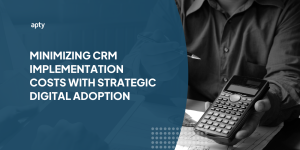Technology profoundly influences how businesses operate and grow; understanding and utilizing the power of Enterprise Resource Planning (ERP) systems is more crucial than ever. These systems are not just tools but strategic enablers that integrate, automate, and streamline various business processes, from finance to supply chain management. The business value of ERP lies in its ability to transform data into actionable insights, fostering informed decision-making across the organization.
The business value of ERP is highlighted by its growing market. In 2024, approximately 1.4 million companies are projected to invest $183 billion in ERP software, underscoring its critical role in modern business operations. This investment is a reflection of the system’s ability to integrate and automate diverse business functions, offering a unified approach to managing finance, supply chain, and human resources among other areas.
As more companies embrace digital transformation, cloud ERP adoption is key to maintaining agility and competitiveness. Implementing these systems effectively, however, presents its own set of challenges, particularly in ensuring user adoption and maximizing ERP value.
Cloud ERP adoption, a significant trend in the ERP, is transforming how organizations approach these systems. 65% of organizations used cloud-based ERP, indicating a substantial shift from traditional on-premises systems. This move towards cloud ERP not only speaks to the demand for more flexible and scalable solutions but also reflects the changing needs of businesses in a competitive market.
However, the successful ERP implementation and maximization of value hinge on effective user adoption. Digital Adoption Platforms (DAPs) are proving crucial in this regard, providing the necessary support and guidance to ensure users can fully leverage the capabilities of these complex ERP systems.
Let’s explore the transformative impact of these systems on business operations and their role in driving innovation and growth.
The core of ERP – Driving Enterprise Value
The essence of ERP lies in its capability to boost enterprise value. Through streamlining various operations, ERP systems curtail operational costs, augment productivity, and optimize resource management. They also render valuable insights via data analytics, enabling organizations to make strategic, informed choices. For example, an ERP system can help a business accurately predict demand, optimize inventory, and adapt swiftly to market shifts.
Integrating and Streamlining Operations
ERP systems excel in integrating various business functions into a single, coherent framework. This integration is not just about centralizing data; it’s about creating synergies between different departments. For example, when finance, supply chain, and customer service data are interconnected, it provides a holistic view of the organization, leading to better decision-making and strategy formulation.

Data-Driven Decision Making
The power of ERP systems in harnessing data cannot be overstated. By providing real-time access to critical business data, these systems enable leaders to make informed decisions. This aspect is particularly important in today’s business environment, where data-driven strategies often dictate market success. For instance, ERP systems can analyze market trends, consumer behaviors, and internal process efficiencies, offering actionable insights that drive business growth.
Enhancing Operational Efficiency
ERP’s ability to automate routine tasks translates into significant efficiency gains. By reducing the time and resources spent on manual processes, organizations can reallocate efforts to more strategic initiatives. This shift not only boosts productivity but also contributes to cost savings. A survey by Panorama Consulting Group found that 31% of organizations identified “support growth” v as their primary reason for implementing an ERP system.
Facilitating Scalability and Flexibility
The ability to scale and adapt is essential. Cloud ERP systems, in particular, offer scalability that traditional on-premises solutions can’t match. They allow businesses to expand or modify their operations without the need for significant capital investment in IT infrastructure. As reported by TechTarget, 95% of organizations are open to cloud-based ERP systems, underlining their readiness to embrace flexible and scalable solutions.
Challenges in Implementation and User Adoption
Despite these advantages, implementing ERP systems comes with challenges. One key hurdle is ensuring effective user adoption. A successful ERP implementation requires technical integration and cultural adaptation within the organization. Employees need to be trained and supported to fully utilize the new system. This is where Digital Adoption Platforms (DAPs) become crucial, offering guided training and support to ensure a smooth transition.
The strategic impact of ERP on business operations is multifaceted. ERP systems are fundamental to the modern business strategy, from integrating business functions and enabling data-driven decision-making to enhancing efficiency and scalability. However, realizing their full potential requires careful planning, implementation, and a focus on user adoption. As we move forward, it’s clear that ERP will continue to be a key driver of business innovation and success.
Learn More: 9 ERP Implementation Strategies and How Digital Adoption Platforms Facilitate Seamless User Adoption of ERPs
Enhancing Business Performance with Cloud ERP
The shift to cloud-based Enterprise Resource Planning (ERP) systems is more than a technological upgrade; it’s a strategic evolution in business management. Cloud ERP represents a paradigm shift in how organizations access, process, and leverage their operational data.
Scalability and Flexibility of Cloud ERP
One of the most significant advantages of cloud ERP is its scalability. Businesses can adjust their ERP capabilities as they grow or their needs change without substantial capital investment in IT infrastructure. This flexibility is crucial in today’s rapidly changing business environment. According to TechTarget, 95% of organizations are open to adopting cloud-based ERP solutions, signifying a significant shift towards more agile and adaptable systems.

Cost-Effectiveness and Accessibility
Cloud ERP systems offer a more cost-effective solution compared to traditional on-premises systems. The subscription-based model of cloud ERP reduces the need for upfront capital expenditure, making it an attractive option for businesses of all sizes. Additionally, cloud ERP enhances accessibility, allowing employees to access critical business information from anywhere, especially in remote and hybrid work environments.
Improved Operational Efficiency
Implementing cloud ERP can significantly improve operational efficiency. A study by Panorama Consulting Group revealed that businesses adopting cloud ERP reported enhancements in process efficiencies, data accuracy, and decision-making capabilities. These systems automate many routine tasks, freeing employees to focus on more strategic and value-adding activities.
Challenges in Cloud ERP Adoption
Despite its advantages, transitioning to cloud ERP is not without challenges. Key among these is ensuring seamless migration and user adoption. Many businesses face hurdles in data migration, integration with existing systems, and training employees to utilize the new system effectively. Organizations are increasingly turning to Digital Adoption Platforms (DAPs), which provide comprehensive support and training to facilitate smoother transitions to cloud ERP systems, to address these challenges.
Cloud ERP systems are transforming business operations, offering scalability, cost-effectiveness, and improved efficiency. As more businesses embrace this technology, the focus on practical implementation and user adoption becomes paramount. With the right strategies and tools, cloud ERP can be a powerful asset in driving business performance and competitiveness in the digital age.
The Business Value of ERP Software
Let’s explore the valuable benefits and tangible business value that ERP software provides to organizations. Adopting ERP systems is a strategic investment that can bring significant returns in various aspects of business operations.

Operational Efficiency and Cost Reduction
A primary benefit of ERP systems is the significant enhancement in operational efficiency. By automating and streamlining processes, ERP reduces manual labor and minimizes errors, leading to cost savings and improved productivity. For instance, a survey by Panorama Consulting Group found that 31% of organizations identified support for growth as a primary reason for ERP implementation, highlighting its role in enhancing operational capabilities.
Data Accuracy and Improved Decision-Making
ERP systems provide an integrated platform for data management, ensuring data accuracy and consistency across the organization. This accuracy is crucial for informed decision-making, as leaders rely on this data to make strategic choices. A study indicates that 71% of businesses hope to use their ERP data to make operations more efficient, and 63% want to use it for descriptive analytics to understand past events.
Supporting Business Growth and Scalability
ERP software is instrumental in supporting business growth and scalability. It allows businesses to manage increased complexity without proportional increases in overhead or staffing. Cloud-based ERP systems, in particular, offer the flexibility to scale up or down based on business needs, making them ideal for growing businesses.
Challenges in Realizing ERP Value
Despite these benefits, realizing the total value of ERP software can be challenging. It requires the right technology, effective implementation, change management, and continuous optimization. User adoption is a critical aspect, as the value of ERP is directly tied to how effectively it is used within the organization.
The business value of ERP software is multifaceted, encompassing operational efficiency, data accuracy, decision-making, and support for growth. However, realizing this value requires a comprehensive approach beyond technology deployment. It involves strategic planning, effective implementation, and fostering a culture that embraces digital transformation.
Measuring ROI in ERP
The ROI of an ERP system is measured not just in financial terms but also in improvements in processes and operations. According to a report by Ultraconsultants, 80% of organizations achieved their projected ROI after ERP implementation, with 58% achieving it within the expected timeline. This reflects the significant impact of well-implemented ERP systems on an organization’s bottom line and operational efficiency.

Key Metrics for ERP Success
When evaluating the success of an ERP implementation, several key metrics are often considered:
- Process Improvement: This includes reducing cycle times, increasing on-time delivery, and improving inventory turns.
- Cost Reduction: This metric looks at the reduction in operational costs, such as labor and inventory carrying costs.
- Data Accuracy: Improving data accuracy and reducing data duplication are important for informed decision-making.
- Employee Productivity: Increased employee productivity due to automation of routine tasks and streamlined processes.
Challenges in Measuring ERP ROI
Measuring the ROI of ERP implementations can be challenging. It involves tracking financial metrics and considering qualitative improvements like increased customer satisfaction or enhanced decision-making capabilities. Additionally, organizations must be patient, as the full benefits of ERP implementations might take time to materialize fully.
The ROI and metrics involved in ERP implementations are crucial for organizations to understand the value they derive from these systems. While financial returns are important, processes, operations, and employee productivity improvements are equally valuable. Effective measurement and continuous optimization are key to realizing the full potential of ERP systems.
Read More: 8 Tips to Maximizing ROI of ERP Implementation: Strategies for Reducing Operating Costs
Role of DAPs in Empowering ERP Software Value
In Enterprise Resource Planning (ERP), the role of Digital Adoption Platforms (DAPs) has become increasingly pivotal. As organizations invest in ERP systems to streamline their operations and improve efficiency, the challenge often lies in maximizing the value of these complex systems. This is where DAPs come into play, acting as catalysts for enhancing the value and effectiveness of ERP software.
Bridging the User Adoption Gap
A common obstacle in ERP implementation is user adoption. Given the complexity and scope of ERP systems, users often need help navigating and utilizing these systems to their full potential. DAPs address this challenge by providing interactive, in-app guidance and support, making it easier for users to understand and engage with the ERP software.
Enhancing Training and Onboarding
Effective training and onboarding are crucial for successful ERP deployment. DAPs streamline this process by offering personalized learning paths, contextual assistance, and real-time support. This targeted approach ensures that employees can quickly become proficient in using the ERP system, thereby reducing the learning curve and increasing overall productivity.
Driving ERP Utilization and Efficiency
DAPs aid in user adoption and play a crucial role in driving the overall utilization and efficiency of ERP systems. By providing insights into user behavior and system usage, DAPs enable organizations to identify and address areas where the ERP system is underutilized or where users encounter difficulties. This data-driven approach helps continuously refine and optimize the ERP system to meet the evolving needs of the business.
Facilitating Continuous Improvement
Business technology continually evolves, and ERP systems are no exception. DAPs support continuous improvement by offering agile and adaptable learning and support tools that can grow with the ERP system. This ensures that as new features and updates are added to the ERP system, users can quickly adapt, providing the organization always leverages the latest capabilities of its ERP investment.
In conclusion, Digital Adoption Platforms like Apty are integral in unlocking the full value of ERP software. They bridge the gap between complex ERP functionalities and user proficiency, ensuring businesses can fully realize the benefits of their ERP investment. As businesses continue to navigate the complexities of digital transformation, DAPs will remain essential in empowering users, optimizing processes, and driving the strategic value of ERP systems.












